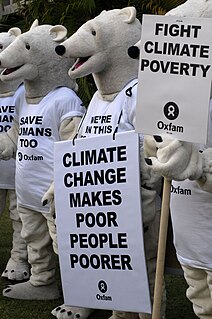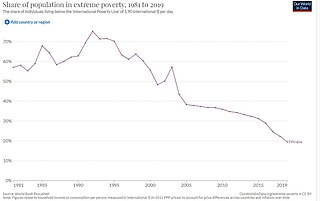Related Research Articles

The economy of Guatemala is a considered a developing economy, highly dependent on agriculture, particularly on traditional crops such as coffee, sugar, and bananas. Guatemala's GDP per capita is roughly one-third of Brazil's. The Guatemalan economy is the largest in Central America. It grew 3.3 percent on average from 2015 to 2018. However, Guatemala remains one of the poorest countries in Latin America and the Caribbean, having highly unequal incomes and chronically malnourished children. The country is beset by political insecurity, and lacks skilled workers and infrastructure. It depends on remittances for nearly one-tenth of the GDP.

Gross Domestic Product (GDP) in Niger was worth 13.68 billion US dollars in 2020, according to official data from the World Bank, based largely on internal markets, subsistence agriculture, and the export of raw commodities: foodstuffs to neighbors and raw minerals to world markets. Niger, a landlocked West African nation that straddles the Sahel, has consistently been ranked on the bottom of the Human Development Index, at 0.394 as of 2019 with a relatively low per capita income, and ranks among the least developed and most heavily indebted countries in the world, despite having large raw commodities and a relatively stable government and society not currently affected by civil war or terrorism. Economic activity centers on subsistence agriculture, animal husbandry, re-export trade, and export of uranium.

Poverty is the state of having few material possessions or little income. Poverty can have diverse social, economic, and political causes and effects. When evaluating poverty in statistics or economics there are two main measures: absolute poverty compares income against the amount needed to meet basic personal needs, such as food, clothing, and shelter; relative poverty measures when a person cannot meet a minimum level of living standards, compared to others in the same time and place. The definition of relative poverty varies from one country to another, or from one society to another.

International development or global development is a broad concept denoting the idea that societies and countries have differing levels of economic or human development on an international scale. It is the basis for international classifications such as developed country, developing country and least developed country, and for a field of practice and research that in various ways engages with international development processes. There are, however, many schools of thought and conventions regarding which are the exact features constituting the "development" of a country.
Governance is the process of interactions through the laws, norms, power or language of an organized society over a social system. It is done by the government of a state, by a market, or by a network. It is the decision-making among the actors involved in a collective problem that leads to the creation, reinforcement, or reproduction of social norms and institutions". In lay terms, it could be described as the political processes that exist in and between formal institutions.

The Millennium Development Goals (MDGs) were eight international development goals for the year 2015 that had been established following the Millennium Summit of the United Nations in 2000, following the adoption of the United Nations Millennium Declaration. These were based on the OECD DAC International Development Goals agreed by Development Ministers in the "Shaping the 21st Century Strategy". The Sustainable Development Goals (SDGs) succeeded the MDGs in 2016.

Participatory budgeting (PB) is a type of citizen sourcing in which ordinary people decide how to allocate part of a municipal or public budget through a process of democratic deliberation and decision-making. Participatory budgeting allows citizens or residents of a locality to identify, discuss, and prioritize public spending projects, and gives them the power to make real decisions about how money is spent.
Poverty Reduction Strategy Papers (PRSPs) are documents required by the International Monetary Fund (IMF) and World Bank before a country can be considered for debt relief within the Heavily Indebted Poor Countries (HIPC) initiative. PRSPs are also required before low-income countries can receive aid from most major donors and lenders. The IMF specifies that the PRSP should be formulated according to five core principles. The PRSP should be country-driven, result-oriented, comprehensive, partnership-oriented, and based on a long-term perspective. The PRS process encourages countries to develop a more poverty-focused government and to own their own strategies through developing the plan in close consultation with the population. A comprehensive poverty analysis and wide-ranging participation are vital parts of the PRSP formulation process. There are many challenges to PRS effectiveness, such as state capacity to carry out the established strategy. Criticism of PRSP include aid conditionality, donor influence, and poor fulfillment of the participatory aspect.

Poverty reduction, poverty relief, or poverty alleviation, is a set of measures, both economic and humanitarian, that are intended to permanently lift people out of poverty.

Participatory rural appraisal (PRA) is an approach used by non-governmental organizations (NGOs) and other agencies involved in international development. The approach aims to incorporate the knowledge and opinions of rural people in the planning and management of development projects and programmes.
Local Economic Development (LED) is an approach to economic development, of note in the developing world that, as its name implies, places importance on activities in and by cities, districts and regions. Local economic development combines economic development activities, urban planning, infrastructure development and social development activities to improve local conditions. LED encompasses a range of disciplines including physical planning, economics and marketing, all with the goal of building up the economic capacity of a local area to improve its economic future and the quality of life for all.

Participatory development (PD) seeks to engage local populations in development projects. Participatory development has taken a variety of forms since it emerged in the 1970s, when it was introduced as an important part of the "basic needs approach" to development. Most manifestations of public participation in development seek "to give the poor a part in initiatives designed for their benefit" in the hopes that development projects will be more sustainable and successful if local populations are engaged in the development process. PD has become an increasingly accepted method of development practice and is employed by a variety of organizations. It is often presented as an alternative to mainstream "top-down" development. There is some question about the proper definition of PD as it varies depending on the perspective applied. Two perspectives that can define PD are the "Social Movement Perspective" and the "Institutional Perspective":

Robert John Haylock Chambers OBE is a British academic and development practitioner. He spent his academic career at the Institute of Development Studies, University of Sussex. In 2013 he became an honorary fellow of the International Institute of Social Studies.

Climate change and poverty are deeply intertwined because climate change disproportionally affects poor people in low-income communities and developing countries around the world. Those in poverty have a higher chance of experiencing the ill-effects of climate change due to the increased exposure and vulnerability. Vulnerability represents the degree to which a system is susceptible to, or unable to cope with, adverse effects of climate change including climate variability and extremes.
Bangladesh is a developing nation. Despite rapid economic growth, poverty remains a major issue. However, poverty has declined sharply in recent history. Shortly after its independence, approximately 9% of the population lived under the poverty line. However, since economic reforms and trade liberalization of early 1990s, along with accelerated economic growth since early-2000s, Bangladesh have experienced a dramatic progress in reducing poverty. The remarkable progress in poverty alleviation has been recognized by international institutions. According to World Bank, more than 33 million Bangladeshi people have been lifted out of poverty since 2000; as measured by the percentage of people living on the equivalent of US$1.90 or less per day in 2011 purchasing price parity terms.
The world's poor are significantly more likely to have or incur a disability within their lifetime compared to more financially privileged populations. The rate of disability within impoverished nations is notably higher than that found in more developed countries. Since the early 2010s there has been growing research in support of an association between disability and poverty and of a cycle by which poverty and disability are mutually reinforcing. Physical, cognitive, mental, emotional, sensory, or developmental impairments independently or in tandem with one another may increase one's likelihood of becoming impoverished, while living in poverty may increase one's potential of having or acquiring disability in some capacity.
Moving Out of Poverty is a project sponsored by the World Bank, as well as a series of four books describing the results of the project, that aim to understand how people rise up the ladder from poverty to prosperity, and how they may fall back into poverty. comparative research across more than 500 communities in 15 countries on how and why poor people move out of poverty. The series was launched in 2007 under the editorial direction of Deepa Narayan. Other authors of books in the series include Patti Petesch, Lant Pritchett, and Soumya Kapoor. All the books are freely available online as PDFs in the Open Knowledge Repository.
Participatory poverty assessment (PPA) is the approach to analyzing and reducing poverty by incorporating the views of the poor. PPAs attempt to better understand the poor, to give the poor more influence over decisions that affect their lives, and to increase effectiveness of poverty reduction policies. PPAs are seen as complements to traditional household surveys by helping to interpret survey results, and aim to capture the experiences of the poor by being more open-ended.
Deepa Narayan is a social scientist who authored and co-authored more than 15 books including Chup: Breaking The Silence About India's Women. She is also an independent advisor for poverty, development and poverty and has experience working for the World Bank, United Nations and various NGOs. She has been listed as one of the top 100 Global Thinkers by Foreign Policy magazine in 2011, and part of the top 100 Disruptive Heroes by Hacking Work.

The African country of Ethiopia has made massive strides towards alleviating poverty since 2000 when it was assessed that their poverty rate was one of the greatest among all other countries. The country has made great strides in different areas of the Millennium Development Goals including eradicating various diseases and decreasing the rate of child mortality. Despite these improvements, poverty is still extremely high within the country. One of the leading factors in driving down poverty was the expansion of the agricultural sector. Poor farmers have been able to set higher food prices to increase their sales and revenue, but this expansion has come at a cost to the poorest citizens of the country, as they could not afford the higher priced food. One of the biggest challenges to alleviating this issue is changing the structure of Ethiopia's economy from an agricultural-based economy to a more industry-based economy. The current strategy for addressing poverty in Ethiopia is by building on existing government systems and development programs that are already in place within the country.
References
- 1 2 3 McGee, Rosemary, ed. Knowing Poverty. London, GB: Routledge, 2012. ProQuest ebrary. Web. 11 May 2016.
- ↑ "Overview". World Bank. Archived from the original on June 21, 2012. Retrieved May 17, 2016.
- 1 2 Andy Norton with Bella Bird Karen Brock Margaret Kakande Carrie Turk (2006). "A rough guide to PPAs" (PDF). Overseas Development Institute.
- ↑ "Voices of the Poor - From Many Lands" (PDF).
- 1 2 Hiroki Nogami (2003). "Book review of Voices of the Poor" (PDF). The Developing Economies.